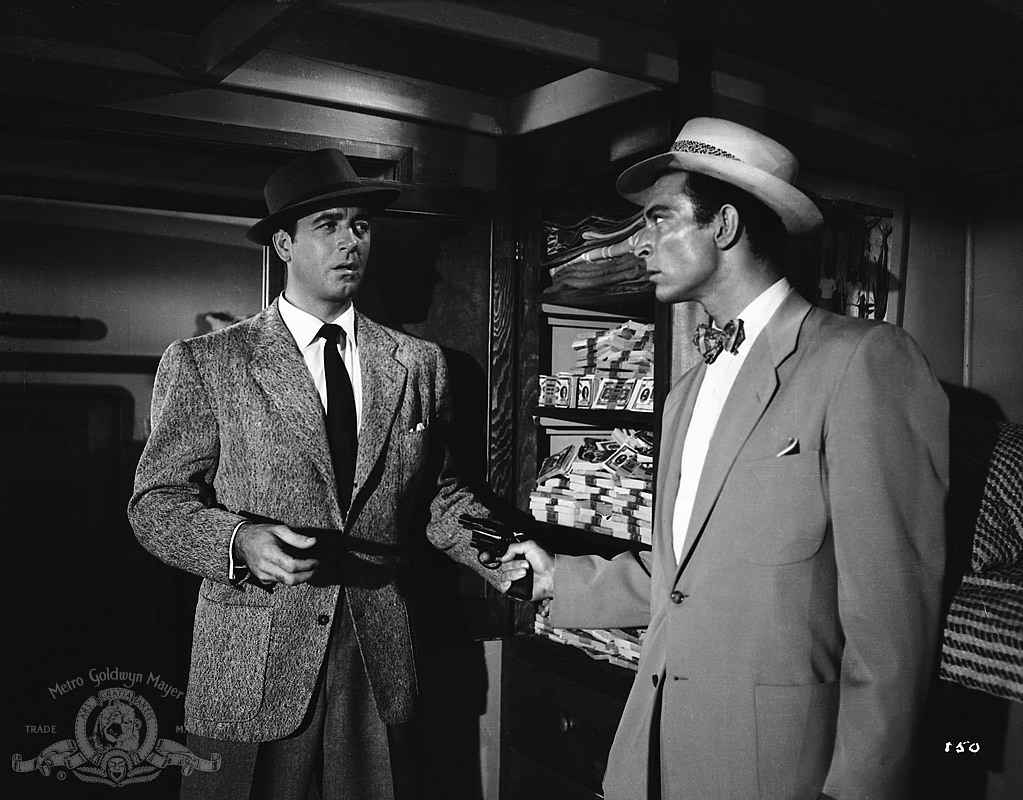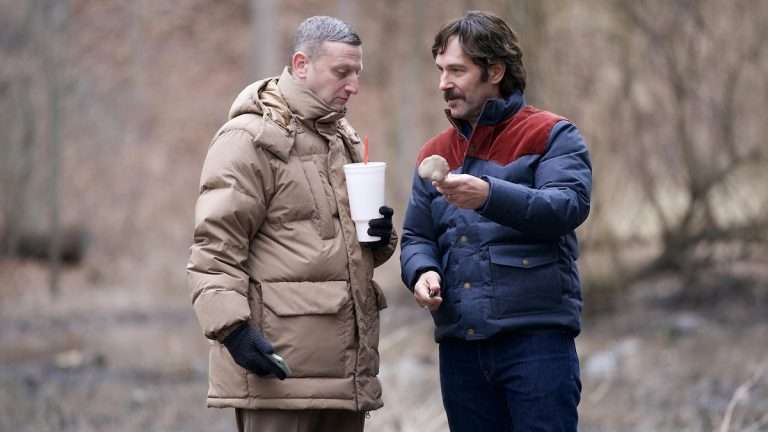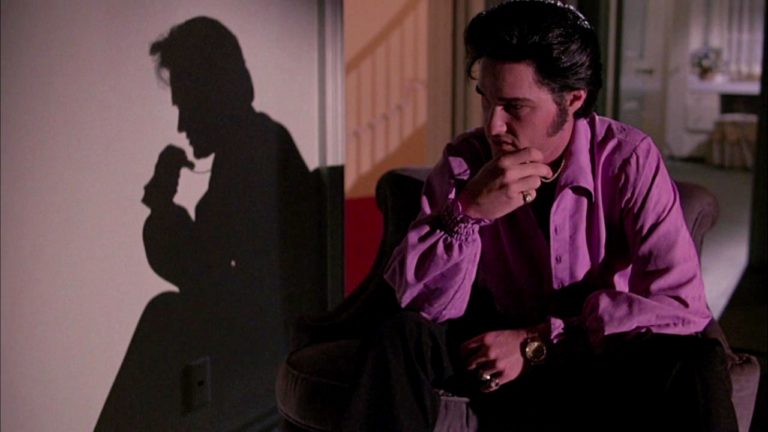Post-war trauma rests at the heart of Film Noir – the reason the style of film exists. Young men returned from war to a world that had since moved past them. This left many men bitter and disillusioned, with no direction in life except to accept the lucrative life of crime. In Phil Karkson’s Kansas City Confidential, Joe Rolfe (John Payne) is a man too well aware of this cold hard fact. He is a recipient of the Purple Heart for valor, but his life is as empty as the trinket he possesses. Being a celebrated soldier finds him no success; a past criminal record doesn’t help either, and he is stuck as a mere truck driver for a floral company.
His life takes a sharp turn when the mysterious Mr. Big gets involved, a mastermind planning a bank heist. Mr. Big finds three criminals, much like Joe, drowning in their own troubles to aid him in this mission. The nervous Pete Harris (Jack Elam), the muscle Boyd Kane (Neville Brand), and the debonair Tony Romano (Lee Van Cleef) are all kept unaware of each other’s identities, including that of Mr. Big, using masks. They are tasked with robbing the bank, disguised in a similar Florist’s truck, escaping in the commotion.
Joe is sadly entrapped over the crime, punished to squeal, and eventually let go while the media tarnishes his remaining reputation. Joe is driven by the desire for revenge, a key motivator in Phil Karlson’s intense, hard-boiled crime drama. Joe’s pursuit of this revenge and redemption form two central themes that elevate the screenplay far beyond its high-stakes game of cat and mouse.
To find the masked man and the architect behind their scheme, Joe is forced to play detective, a classic role befitting a film noir. The motive of revenge gives his arc a personal touch, while the role of investigator lets the writers play with the tone and the plot. It sends Joe on a whirlwind journey with the Police hot on his tail. The police are convinced Joe still has a role to play in the robbery and will lead them to Mr. Big and his operation.
Using his criminal connections, Joe is able to find his way to Tijuana and apprehend Harris. He hopes to use Harris to apprehend the remaining criminals who were part of the heist. Though the writing simplifies Joe’s journey in the beginning, it brings us to the meat of the story that’s full of duplicity and deception. Adopting the identity of Harris, Joe arrives at the seaside resort in Borados, where the criminals are set to divide the money. Joe must figure out who the rest of the criminals are and expose Mr. Big’s identity. The writers reveal early on who Mr. Big is, yet the tension of his discovery is enhanced as the narrative, in a layered manner, reveals the danger he possesses for Joe.

Mr. Big is a former police officer, Tim Foster (Preston Foster), who seeks to return to the force after a scandal got him fired. Foster plans to use the scheme of the heist and the temptation of the loot to nab the criminals he worked with to restore his own tarnished image as well as earn the hefty reward money for their capture.
Despite being unsure of each other’s true identities and motives, Joe and Tim remain dueling forces entrenched deeply into the aforementioned themes of the screenplay. Redemption plays a vital part in their endgame, as can be seen in the film’s opening portions once the inciting incident occurs. Despite the glory he has attained as a soldier, Joe is incapable of living down his criminal past. Joe’s legal issues are a shadow that haunts his every action. Karlson uses this plot point to question the system and society that reprimands criminals but also affords them no recourse for rehabilitation.
The police and Tim play a crucial part; he, too, is a victim of the system but also an instigator of the unfairness within it. He has an easier path to saving his lost position but is also faced with moral complexities in attaining this. The screenplay sensibly blurs the lines between good and evil: what is lawfully wrong and what is morally unfair. In the middle of this, the writers throw in the entangled web of a romantic affair.
Tim’s daughter Helen (Colleen Gray) arrives, throwing a wrench in his plans, especially when she and Joe begin falling in love. Her aspirations to become a lawyer also play with the heart of the moral dilemma both men are faced with. Unfortunately, it distracts from examining the rest of the cast of crooked characters.
Cleef and Brand draw the short end of the stick as the plot gets repetitive with their roles. The tension between the remaining two crooks and Joe is played out in a constant game of one-upmanship. The plot beats still allow for some fun, as Joe finds it difficult to maneuver and manipulate his way into discovering key bits of information as an amateur detective.
Unlike the minor antagonists, the film naturally allows John Payne to perform dynamically. He grows into the role of being a tough guy, his eyes flaring up, indicating how this world has wronged him. Scenes where he gets to fight back, are punctuated by the tenderness he shares with Gray’s naïve woman; the romantic chemistry is sweet, if nothing else. Gray displays her charms, the softness of the lighting giving her the glow that really aids most girl-next-door type roles in the genre.
The film belongs to Preston Foster, and the writing surrounding his character is the most complex and interesting of the bunch. It’s a masterful turn when the revelation of his secrets comes tumbling through the plot. Preston Foster’s poker face is as solid as the characters during the games of cards. Preston is able to deliver a turn full of measured calm, while as the story unravels, he also displays enough bug-eyed tensions over everything falling apart.
The writing in this scenario aids him, with the climax returning to the idea of redemption and the necessity of the protagonist and antagonist’s actions in attaining it. The two men’s shared fate leaves the film with a sensitivity that no cruel revenge can measure up to. The craft surrounding the film isn’t much worth discussing. Yet the writing in Kansas City Confidential finds a gentle heart under the hard-boiled genre, which is where the film comes out a real winner.
★★★½
Read More: 10 Noir Films That Are Under 90 Minutes
Kansas City Confidential (1952) Movie Links: IMDb, Rotten Tomatoes
Kansas City Confidential (1952) Movie Cast: John Payne, Coleen Gray, Preston Foster



![Extraction [2020] Netflix Review: An effort that is mediocre at best](https://79468c92.delivery.rocketcdn.me/wp-content/uploads/2020/04/Extraction-cover-1-768x384.jpg)


![Putham Pudhu Kaalai Vidiyaadha [2022] Review: ‘Loners’ Steals the Show in this Hit-and-miss Pandemic Anthology on Human connection](https://79468c92.delivery.rocketcdn.me/wp-content/uploads/2022/01/Putham-Pudhu-Kaalai-Vidiyaadha-768x384.jpg)